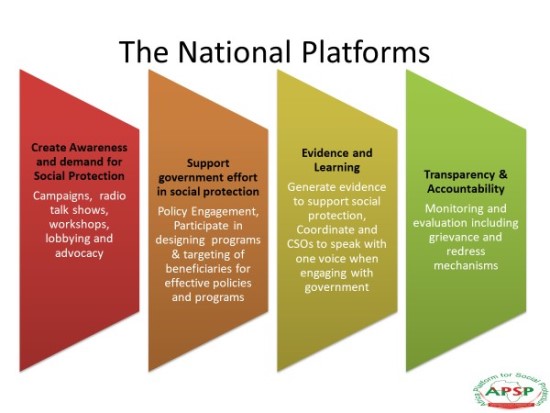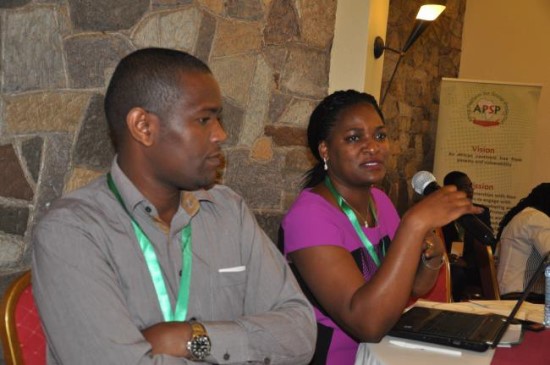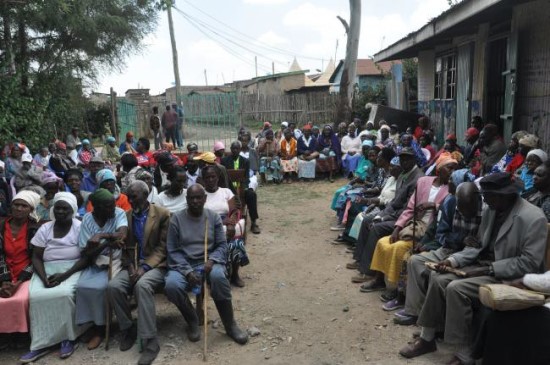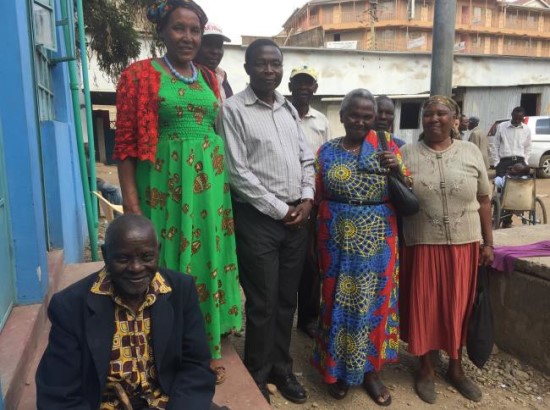The African Platform for Social Protection (APSP) has become an important player in the quest for better living conditions on the continent, with growing recognition and policy impact. Co-organiser of the January meeting of the core group of Global Coalition for Social Protection Floors held in Nairobi, Kenya (see ICSW January 2018 newsletter), the APSP is committed to promoting and strengthening the social contract between states and citizens to deliver social protection for all. Founded in 2008 in the wake of the adoption of the African Union’s ‘Social Policy Framework for Africa’, the Platform’s vision is that of an African continent free from poverty and vulnerability.
The APSP’s approach is to further national social protection policies and programmes across Africa by promoting active civil society engagement and partnerships in their design and delivery. With its regional base in Nairobi Kenya, it works with a network of 27 national platforms of civil society organisations across Africa, and has a board drawn from all five regions of the African Union. Each platform is dedicated to enhancing and extending civil society participation in their national social protection programmes so as to ensure that they are effective and reach the poorest of all walks of life. Platforms encourage the involvement of those civil society organisations that represent some of the most marginalised in society – older people, people with disabilities, vulnerable girls and women, slum dwellers and those in remote communities, among others.
All platforms share a broad definition of social protection as ‘a set of policies and programmes designed and implemented by the state and other stakeholders to reduce poverty and vulnerability by cushioning people’s exposure to risk, and enhancing their capacity to protect themselves against shocks and the interruption or loss of income and promote their ability to come out of poverty”. Social protection is also defined by the right to social security, as enshrined in the Universal Declaration of Human Rights (articles 22 and 25), the International Covenant on Economic, Social and Cultural Rights (article 9) and reaffirmed in a range of other instruments, including the 2009 African Union Social Policy Framework and the Agenda 2030 Goal 1, target 1.3. National platforms, therefore, promote awareness of these rights and frameworks.
At the heart of each platforms’ work is an integrated programme which encompasses the following: advocacy for national efforts to put in place and extend social protection programmes; gathering and sharing evidence of what is working and what could be done better; engaging in national and at times regional dialogues on evidence, programming and financing; and monitoring of existing programmes.

Modalities of work of the National Platforms
|
Even though policy frameworks for social protection exist, with some progress in national implementation across Africa, full commitment to and ownership of social protection systems that are coordinated, universal in nature and properly financed has yet to be achieved. In the countries with the most progress it has been found that solid, transparent systems for the design and delivery of social protection are essential pillars for their financing, extension and sustainability. If corruption and clientelism is suspected in their management and execution the political support necessary for their extension is eroded. At the same time, government commitment to social protection is enhanced by demand from citizens who are aware of their rights and are prepared to engage with their ideas on social protection design and roll out.
The APSP - regionally and through its national platforms – sets great store on the ‘social contract’ between government and citizens. Citizen engagement in programme design, the monitoring of delivery, and grievance and redress mechanisms have been proven to be essential elements to ensure governmental and constitutional support for such programmes and to ensure that the modalities are in place for transparent and accountable schemes.

Discussing new approaches to social protection in Africa, meeting in Nairobi.
|
During the Nairobi meeting in January 2018 participants had the opportunity to learn about the APSP vision and its advances. Work at the national level was described in the reports from Ghana, Zambia, Gambia, Mozambique, Uganda and the DRC amongst others. Platform representatives explained that, while the work programme of each national platform varies according to context, there are common features. These are to encourage social protection awareness amongst citizens, to foster coordination between different and sometimes competing schemes and bring to light what is working well and not so well, and to further social accountability through citizen monitoring and social protection ‘audits’. Important to all national platforms are efforts to engage citizens in the call for greater coverage of existing schemes and to work with government to promote income support across the lifecycle and for access to health for all.
Engagement in policy formulation and programme design on the basis of evidence from the grassroots has led to notable progress. In Ghana, for example, the work of the Platform has contributed hugely to the national strategy on social protection. Ghana’s 2016 policy and the National Social Protection Act now encompasses four interlinked programmes of essential health care for all and a minimum income package for children, those of working age and for older persons. The national platform of Zambia is focussing on ensuring that minimum income is protected and delivered through the lifecycle, as well as strengthening and enhancing of existing income and health systems through improved coordination between schemes and providers, and investment in extended coverage.

Meeting with recipients of social protection schemes in Kenya.
|
Another common feature identified by the regional and national platforms that inhibits progress on social protection is the gap (or disconnect) – real or perceived - between researchers, policy makers, implementers and the recipients of the service or benefit. Dialogue is important to bridge this gap. The results of social protection ‘accountability audits’, one of the activities of the APSP - which examine quality of services and identify gaps in provision as well as what is working well - provide essential material for regular discussion with key social protection stakeholders in government, academia and civil society.
Participants in the field trips in Nairobi organised by the Kenya Platform saw for themselves how its civil society partners work with the grassroots to gather evidence on the impact on social protection schemes. Working within the community the Kenya Platform assesses the impact and monitors the delivery of existing cash benefits ($20.00 every 2 months) to older persons aged 70 and over, persons with severe disabilities and households with orphans. The Platform identifies glitches in registration that can lead to individuals being struck out of the scheme, and corrects mistakes. Participants heard how regular income coming into the hands of older women not only supported the care of their grandchildren and better nutrition for the family but has also resulted in flourishing local businesses run by women in their 70’s and 80’s. Regular cash received by a severely disabled young man has enabled him to support his own father to access proper medical care and to finance his own IT consultancy.

Recipients of the cash transfer scheme in Kenya, with Samuel Obara of the Africa Platform of Social Protection (standing middle) January 2017
|
Regular dialogue based on social protection auditing improves evidence-based policy, leading to realistic and long-term financing and improved services. ln the case of Kenya, grassroots engagement in such auditing has revealed that the delivery of a benefit through a mobile phone - at one stage the preferred system - could not be guaranteed to reach the recipient. The result is that the system has now been changed for the benefit to be delivered to recipients at fixed delivery points that should not be more than 6 kilometres from the residency of the recipient. Registration glitches through computer errors are being identified locally and corrected through the support of the Platform and its partners. Further auditing is revealing the difficulties in road access to the delivery points owing to poor public transport, and the cost of taxis for some recipients, which can amount to half the benefit of $20.00. Discussions on how to solve this problem are ongoing. Ms. Susan Mochache, Principal Secretary, State Department of Social Protection of Kenya, who met the participants of the global coalition during the meeting described the importance of this work for the ongoing development of Kenya’s social protection programme, referring to the work of the Platform in Kenya as ‘the voice’ for the Ministry.
There is much to do and a road to travel before social protection is fully operational across Africa. With its core values of transparency, accountability, inclusiveness and participation, innovation and integrity the Africa Platform for Social Protection is well placed to be at the forefront of this challenge. Its unique and integrated programme combining advocacy, programme implementation, the bridging of gaps and creating awareness and knowledge on Social Protection is strategic and grounded in national and regional understanding so as to ensure that no one is left behind.
Membership in and input to global bodies such as the Global Coalition of Social Protection Floors and the ICSW will enhance mutual capacity and understanding to bring about a real and lasting difference for millions of people, now and in the future.
For further information: http://www.africapsp.org/
Dr Tavengwa Nhongo, Director Africa Platform for Social Protection (tavenhongo at gmail.com)
By Sylvia Beales Gelber (sylvia.bealesgelber at gmail.com)
Source: Global Cooperation Newsletter – March 2018, International Council on Social Welfare (ICSW)